All posts by webadmin
The Navy’s New Torpedo Will Send Russian and Chinese Subs Running

ey point: As more countries build submarines, anti-submarine warfare will become a bigger deal.
Many details of the new weapon, which include newer propulsion mechanisms and multiple kinds of warheads, are secret and not publically available. However, senior Navy leaders have previously talked to Scout Warrior about the development of the weapon in a general sense.
Naturally, having a functional and more high-tech lethal torpedo affords the Navy an opportunity to hit enemies at further standoff ranges and better compete with more fully emerging undersea rivals such as Russia and China.
Progress with new torpedo technologies is happening alongside a concurrent effort to upgrade the existing arsenal and re-start production of the Mk 48, which had been on hiatus for several years.
The earlier version, the Mk 48 Mod 6, has been operational since 1997 – and the more recent Mod 7 has been in service since 2006.
Lockheed has been working on upgrades to the Mk 48 torpedo Mod 6 and Mod 7 – which consists of adjustments to the guidance control box, broadband sonar acoustic receiver and amplifier components.
Lockheed developers told Scout Warrior last year that Lockheed is now delivering 20-upgrade kits per month to the Navy.
Part of the effort, which involves a five-year deal between the Navy and Lockheed, includes upgrading existing Mod 6 torpedoes to Mod 7 as well as buying brand new Mod 7 guidance control sections.
The new Mod 7 is also resistant to advanced enemy countermeasures.
Modifications to the weapon improves the acoustic receiver, replaces the guidance-and-control hardware with updated technology, increases memory, and improves processor throughput to handle the expanded software demands required to improve torpedo performance against evolving threats, according to Navy information on the weapon.The Mod also provides a significant reduction in torpedo radiated-noise signatures, a Navy statement said.Alongside Lockheed’s work to upgrade the guidance technology on the torpedo, the Navy is also preparing to to build new Mk 48s.
Upgrades to the guidance control section in includes the integration of a system called Common Broadband Advanced Sonar System, or CBASS – electronics to go into the nose of the weapon as part of the guidance section, Lockheed developers explained.
The new technology involves adjustments to the electronic circuitry in order to make the acoustic signals that are received from the system that allow the torpedo to better operate in its undersea environment.
Lockheed will deliver about 250 torpedoes over the next five years. The Mk 48, which is a heavy weapon launched under the surface, is quite different than surface launched, lightweight Mk 54 torpedo fired from helicopters, aircraft and surface ships.
The Navy’s Mk 48 torpedo is also in service with Australia, Canada, Brazil and The Netherlands.
A Mk 48 torpedo is 21 inches in diameter and weighs 3,520 pounds; it can destroy targets at ranges out to five miles and travels at speeds greater than 28 knots. The weapon can operate at depths greater than 1,200 feet and fires a 650-pound high-explosive warhead.
India will not allow water to flow to Pakistan: Modi at Charkhi Dadri
Prime Minister Narendra Modi on Tuesday said India would not allow its water to flow to Pakistan.
“For 70 years, the water which belongs to India and the farmers of Haryana flowed to Pakistan. Modi will stop this water (from flowing into Pakistan) and bring to your houses,” the Prime Minister said at an election meeting, the second in two days, here.
He said the farmers of Haryana and Rajasthan had the right over the water that is flowing to Pakistan and was not being stopped by the earlier Indian governments.
“Modi aapki ladai ladega (Modi will fight your battle),” he assured the people at the rally.
The Prime Minister said Chinese President Xi Jinping during their informal summit in Mahabalipuram, Tamil Nadu, told him that he had watched the Aamir Khan-starrer ‘Dangal’ “which showcased excellent performance of daughters of India”.
“I felt really proud of Haryana on hearing this,” he added.
Praising Chief Minister Manohar Lal Khattar, Modi said: “‘Beti Bachao Beti Padhao’ campaign would not have been effective without the support of Haryana villages.”
He slammed Congress leaders for “spreading lies” over Article 370. IANS
-K admn releases 3 politicians from detention
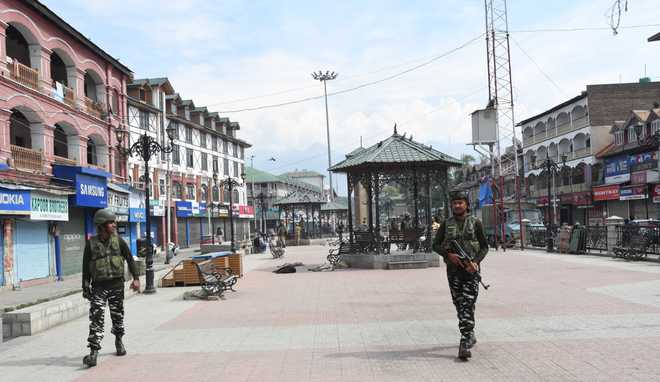
Many leaders had been detained in the Valley in light of the abrogation of Article 370. File photo
Srinagar, October 10
The Jammu and Kashmir Administration on Thursday released three politicians who had been under detention since August 5 when the Centre abrogated the special status granted to the state under the Constitution, officials said.
Yawar Mir, Noor Mohammed and Shoiab Lone were released on separate grounds, the officials said.
While Mir is a former PDA MLA from the Rafiabad Assembly seat, Lone contested unsuccessfully on a Congress ticket from North Kashmir and later resigned as district president of the party.
Noor Mohammed is a National Conference worker who has been managing the party’s show in the militancy-infested Batmaloo area of the Srinagar city.
Before his release, he will be signing a bond to maintain peace and good behaviour, the officials had said on Wednesday night.
The Governor Administration had earlier released Imran Ansari of the People’s Conference and Syed Akhoon on health grounds on September 21.
More than a thousand people, including politicians, separatists, activists and lawyers, were detained after the August 5 move of the Central Government to abrogate the state’s special status.
The detainees include three former chief ministers Farooq Abdullah, Omar Abdullah and Mehbooba Mufti.
Over 250 people were sent to the jails outside Jammu and Kashmir. Farooq was subsequently detained under the stringent Public Safety Act, while other politicians were mostly detained under different sections of the criminal procedure code. PTI
Drones spotted in Punjab’s Hussainiwala sector by BSF
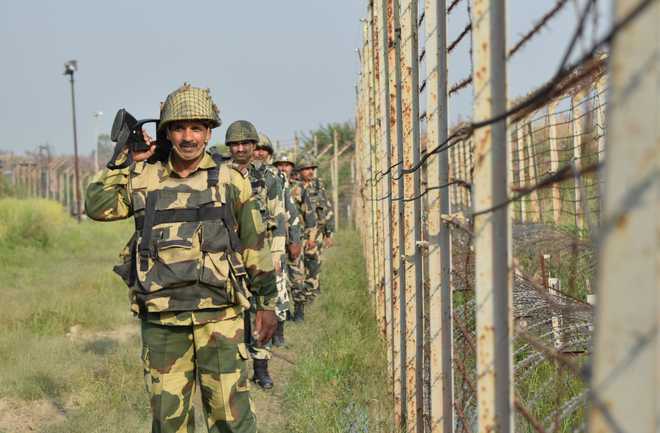
Photo for representation only.
Anirudh Gupta
Ferozepur, October 8
The BSF on Tuesday sighted two high-flying drones along Punjab’s Hussainiwala sector, days after police recovered Pakistani drones used to airdrop arms and ammunition in border areas of the state.
The security forces went into a tizzy as the BSF troops spotted at least five sorties by drones originating from Pakistani side along the Hussaniwala border.
The development comes following confirmed reports about eight earlier sorties by drones used by Pakistan-based terror groups to airdrop almost 80 kg of sophisticated arms and ammunition to foment trouble in Punjab.
As per information, the BSF troops posted here spotted high-flying drones five times between 10 pm to 10:40 pm last night.
Sources said that while four times, the drone was spotted on Pakistani side, however, once the BSF troops belonging to 136 battalion sighted the drone venturing almost a kilometre inside the Indian territory near border outpost HK Tower close to Hussainiwala, around nine kilometres from district headquarters.
Later on, the BSF troops spotted the drone going back towards the Pakistani side but midway its light and sound went off and it could not be tracked further and vanished within no time.
Besides the BOP HK Tower, the BSF troops spotted a drone near border outpost Basti Ram Lal also at 12:25 am which was on Pakistani side.
Later, the BSF troops with assistance of Punjab Police conducted a search operation in the entire area, however, nothing suspicious was found.
“Ferozepur is well guarded by the BSF, besides there is an Army formation. The Pakistani agencies might be conducting aerial surveillance or they might be up to some mischief,” said an official, on condition of anonymity.
Sources said the drone-like objects were flying high with light appearing from them.
“Had they come to drop something, they would have been flying low and moreover, there would have been buzzing sound due to the bearing load,” said another official, while adding that nothing can be said or denied at the moment.
“The information has been shared with concerned authorities and an alert has been sounded,” he said.
On September 24, the BSF/STF had seized huge quantity of sophisticated arms, including five AK-47 rifles, ten magazines, 200 rounds, 1 Austria-made Glock pistol, 22 magazines and 20 rounds, from Mamdot in this area the source of which still remains unknown.
Sources said that following abrogation of Article 370 in Kashmir, the Pakistan’s spy agency Inter-Services Intelligence (ISI) was pushing the Pakistan-based Khalistani terrorists to carry out an attack of 26/11 magnitude in religious places in Punjab.
On September 22, the police had busted a terrorist module being run with the active support of terrorist groups from Pakistan and Germany and had recovered huge cache of arms, including five AK-47 rifles, four Chinese-made .30 bore pistols, nine hand grenades, five satellite phones, which the police claimed had been dropped by a drone.
On September 12, another consignment was seized from a truck at Lakhanpur (Kathua) which included four AK-56 rifles, two AK-47 rifles besides over 10,000 bullets.
Sources said the troops have been asked to keep a hawk’s eye on all such developments and air intrusions.
Meanwhile, the BSF has also started sensitising the residents along the border to immediately inform the police or BSF authorities if they spot anything unusual near the zero line.
Pakistan will only release Kulbhushan Jadhav if India ‘admits he was a spy’

Faced with orders from the ICJ to review Jadhav’s case in the light of Pakistan breaching the Vienna Convention, Islamabad plans to use third-country diplomatic assistance to explore the possibility of sending him home in return for an official admission from New Delhi that he was engaged in espionage, sources close to the Pakistan government have told Firstpost.
Jadhav, an Islamabad-based Pakistani official told Firstpost, is being held in an Inter-Services Intelligence-run facility in Rawalpindi, rather than a prison, even though he is awaiting execution.
Islamabad, one senior Pakistani official said, hopes the offer will help bring about wider India-Pakistan talks, derailed since 2018. “The army understands that Pakistan’s economy cannot be subjected to the risk of another military crisis with India”, the official said. “They see talks as a way to finding some tactical breathing space.”
The deal Pakistan hopes to make builds on a secret diplomatic offer earlier made to New Delhi. Documents submitted to the International Court of Justice show that Pakistan had first offered to extradite Jadhav in a letter dated 30 October, 2017, written soon after India moved the International Court of Justice against his conviction.
“Without prejudice to the proceedings so far”, the letter stated, “the Government of Pakistan is prepared to consider any request for extradition that the Government of India may make in the event that Commander Jadhav is considered to be a criminal under the law of India.”
Put in plain language, the letter constituted an offer to return Jadhav to India, if New Delhi accepted his complicity in terrorism against Pakistan and was prepared to subject him to a criminal-law process.
New Delhi had, however, rejected Islamabad’s offer, seeing it as a ruse to tarnish high officials in the military and intelligence services. Islamabad’s supplementary First Information Report filed on 6 September, 2017 against Jadhav names National Security Advisor Ajit Doval, former naval chief Suresh Mehta, and former Research and Analysis Wing chief Alok Joshi as being among 15 “accomplices and facilitators”.
In a letter dated 11 December, 2017, New Delhi responded by describing Pakistan’s extradition offer as “attempted propaganda”, adding that it had no reason to believe Jadhav had committed any crime for which he could be tried.
Pakistan had made consular access to the incarcerated naval officer contingent on Indian cooperation in investigating the case, seeking statements of the officers, as well as Jadhav’s cellphone records and bank statements.
New Delhi, two Indian official sources said, would still treat any release offer with caution, if it involved an official admission that the country extended support to insurgent groups in Balochistan.
The government has so far declined to discuss several case-related issues—among them, precisely when Jadhav retired from naval service—saying it has no reason to do so until Islamabad provides consular access, and documentation related to the officer’s trial.
Islamabad’s extradition offer, interestingly, was made after the still-unexplained disappearance of former Inter-Services Intelligence Directorate officer Lieutenant-Colonel Mohammed Habib Zahir, who disappeared from Lumbini, in Nepal, in April.
The Pakistan government believes Zahir, who travelled to Nepal lured by an $8,500-per-month offer from Strategic Solutions Consultancy, a non-existent firm, had been kidnapped by Indian intelligence.
From the outset, the Pakistan army’s handling of the Jadhav case has been enmeshed with the country’s civilian-military power struggle. The public naming of high Indian officials — whose names were, notably, absent from a televised custodial confession made by Jadhav—appeared intended to derail the ongoing dialogue between the then Pakistan prime minister Nawaz Sharif and Prime Minister Narendra Modi.
In December 2016, Doval and his Pakistani counterpart, Lieutenant-General Nasser Khan Janjua, had met at a Bangkok hotel to discuss normalisation measures.
The discussions were followed by Prime Minister Modi making an unscheduled visit to Lahore, to greet Sharif on the occasion of his granddaughter’s wedding.
Early in 2018, when Jaish-e-Mohammad terrorists attacked the Indian Air Force base in Pathankot, Sharif had acknowledged the group’s responsibility and ordered officials from the country’s investigation and intelligence services to visit India to gather evidence.
Sharif’s efforts to punish the Jaish spiralled, in coming months, into a frontal break with army chief General Qamar Javed Bajwa.
Indian Army chief’s statement on reactivation of terror camp in Balakot ‘baseless’: Pak
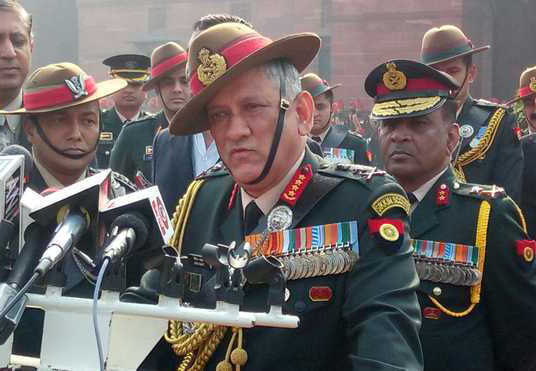
Islamabad, September 24
Pakistan on Tuesday rejected as “completely baseless” the Indian Army chief’s statement on the reactivation of terror camp in Balakot that was destroyed by the Indian armed forces through a surgical strike earlier this year.
Army chief General Bipin Rawat in Chennai on Monday said that Pakistan had reactivated the Balakot terror camp recently and about 500 infiltrators were waiting to sneak into India.
The response to the terror camp getting functional again might go beyond India’s previous response by way of an air strike in February, he told reporters at the Officers Training Academy in the Tamil Nadu capital.
The Indian Army chief’s statement on the reactivation of terror camp in Balakot is “completely baseless”, the Foreign Office said in a statement.
The allegation of “infiltration” from Pakistan reflected “a desperate attempt” by India to divert international attention from the “humanitarian crisis” in Jammu and Kashmir, it said, adding that New Delhi would not “succeed in misleading the world community through these diversionary tactics”.
Tensions between India and Pakistan spiked after India on August 5 revoked Jammu and Kashmir’s special status and bifurcated it into union territories. PTI
Sikh delegation meets Modi, thanks him for removing names from blacklist
Houston, September 22
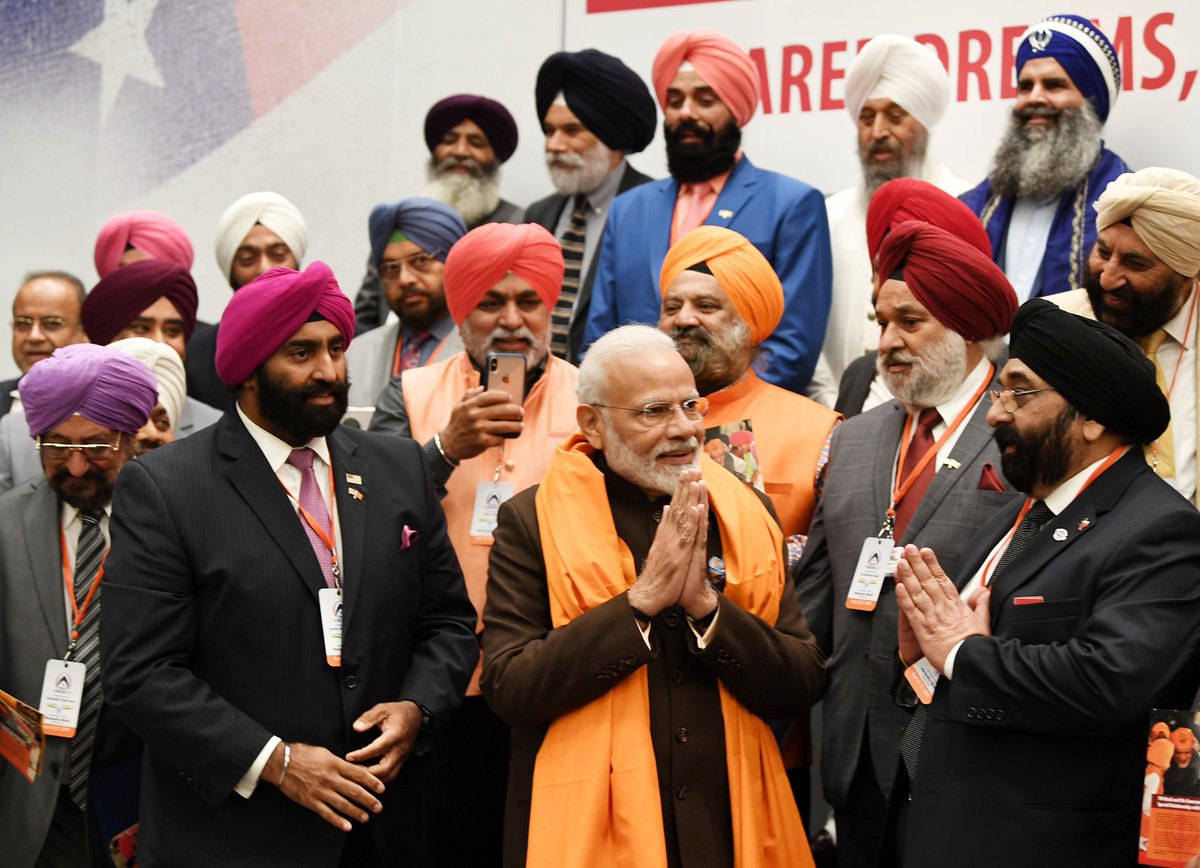
I had an excellent interaction with the Sikh Community in Houston. I am delighted to see their passion towards India’s development!
Visa denial upsets kin of Guru Nanak’s contemporary
Based in Pakistan, Rai Bular Bhatti’s descendants desire to visit Golden Temple
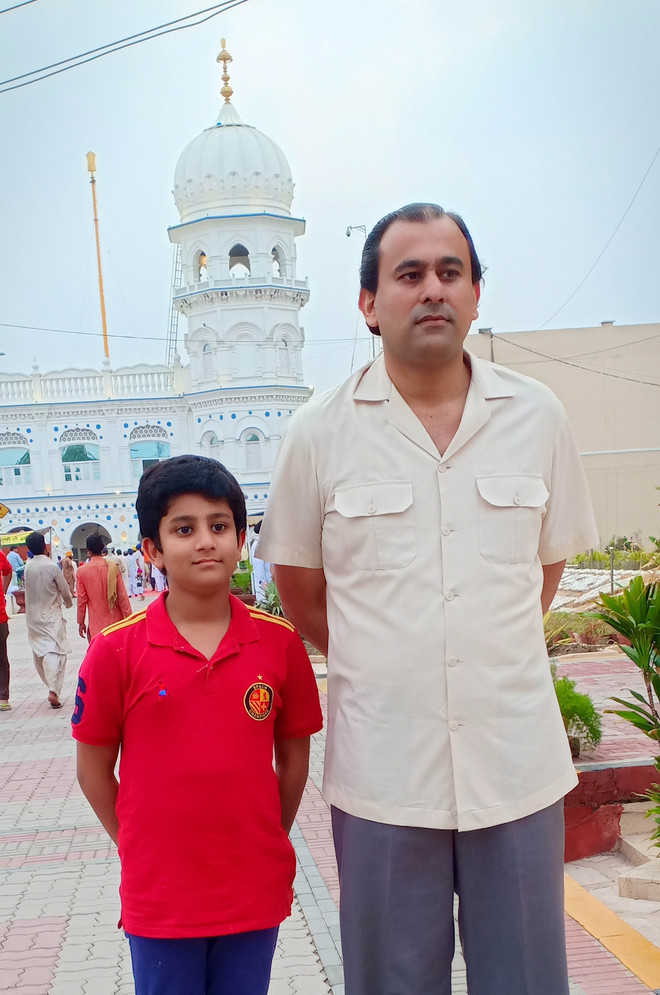
GS Paul
Tribune News Service
Nankana Sahib (Pak), August 4
The descendants of Rai Bular Bhatti, a 15th Century Muslim landlord of undivided Punjab and a disciple of Guru Nanak Dev, are a dejected lot for not getting fulfilled their desire to visit the Golden Temple. Their application for furnishing visa formalities was repeatedly rejected by the Indian authorities.
Rai Saleem Bhatti (41), a lawyer at Lahore High Court and the 19th generation of Rai Bular Bhatti, said till date the visa could not be procured for the reasons best known to the Indian authorities.
SGPC president Gobind Singh Longowal confirmed that the programme could not be held due to non-availability of Bhatti family. “We will take up the matter with the Union Home Department for facilitating visa to Bhatti’s descendants,” he said.
The Bhatti family, despite being devout Muslims, has kept alive their ancestral links with Sikhism for the past several generations.
Rai Saleem Bhatti and his 11-year-old son Rai Waleed Bhatti visited Gurdwara Janam Asthan in Nankana Sahib on the occasion of nagar kirtan dedicated to the 550th birth anniversary of Guru Nanak.
The family still continued the legacy by contributing in every way for the wellbeing of people living in the area. The 16th generation, Rai Bashir Ahmed Bhatti, Rai Hadayat Khan Bhatti played important role in Pakistan politics too. Rai Saleem Bhatti said his cousins Rai Sarvar Khan Bhatti and Rai Ahmad Khan Bhatti’s family had donated 10 acres at Kot Hussan Khan, 5 km from Nankana Sahib, for setting up Nankana Sahib Foundation. The purpose was to generate jobs and revenue for the upkeep of Sikh shrines in Nankana Sahib. “We desire to get it revived and take up the matter with the Pakistan government,” he said.
His father, Rai Akram Bhatti, also a lawyer, wishes to strengthen Sikh-Muslim cordial ties by conducting Sikh pilgrimage to the holy shrines and invite them to his place.
“Our family owes my birth due to the blessings of Baba Nanak only. Sikh devotees from any part of the world who visit Nankana Sahib hold special place in our heart and we take it as a divine opportunity to serve them,” he said.
Guru Nanak’s father Mehta Kalu was a munshi at Rai Bular Bhatti’s estate. Rai Bular Bhatti, who owned over 36,000 acres, had donated half of it to Guru Nanak in late 15th century. “Bhatti had donated around 18,750 acres. On some part of the land Gurdwara Janam Asthan Nankana Sahib and Gurdwara Bal Leela were built. The remaining was leased to locals. The land is now under the control of the Evacuee Property Trust Board, Pakistan,” he said.
SGPC to honour them
- The SGPC wants to set up a portrait of Rai Bular Bhatti, a 15th Century Muslim landlord of undivided Punjab and a disciple of Guru Nanak Dev, in the Central Sikh Museum.
- The programme was scheduled for May 5, 2018, but had to be deferred as Bhatti’s descendants were denied visa.
- Rai Saleem Bhatti, a lawyer at Lahore High Court and the 19th generation of Rai Bular Bhatti, said till date visa could not be procured for the reasons best known to the Indian authorities.
CRPF jawan killed in IED blast in Chhattisgarh’s Bastar district
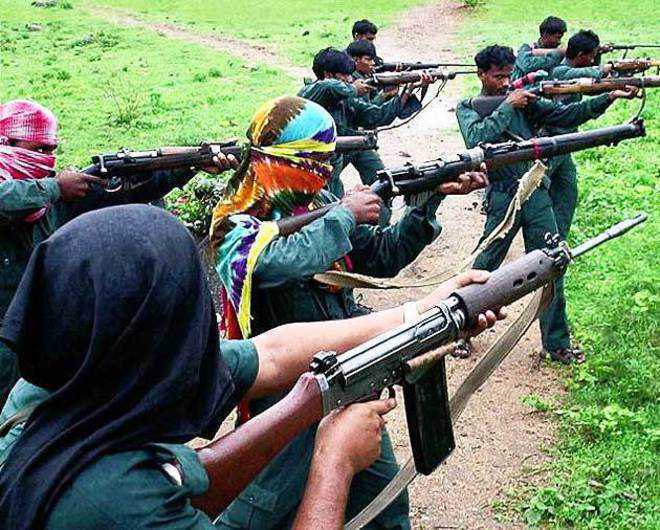
Raipur, July 31
A CRPF jawan was killed in an improvised explosive device (IED) blast triggered by Naxals in Bastar district of Chhattisgarh on Wednesday, officials said.
The blast took place around 6 am near a camp of 195th battalion of the Central Reserve Police Force at Pushpal in Bastar when one of its patrol teams was on its way back, they said.
A constable-rank jawan was trapped in the blast, the officials said. PT




























































